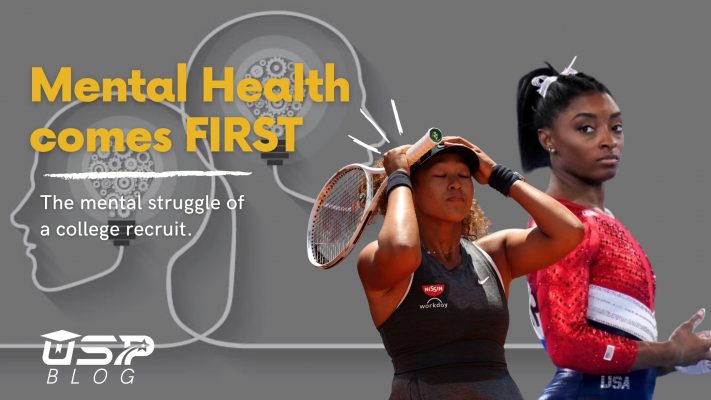Put your mental health first
The mental struggle of a college recruit.

Hours after winning her bronze medal in Tokyo, Simone Biles said on NBC that her biggest takeaway from the summer Games was to “put your mental health first.”
“It doesn’t matter if you’re on the biggest stage,” she continued. “That’s more important than any other medal you could win.”
If you followed the games you were as shocked as me when Simone stepped away from the competition. Bile’s decision was pivotal for mental health in sports, and she demonstrated that being the GOAT means much more than winning and breaking world records.
Biles is not the first world-class athlete to bring the subject to the main stage; Michael Phelps, Kevin Love, Ronda Rousey, and many others have been spreading awareness about this important topic. Just a few months ago, Naomi Osaka communicated that she wanted to skip press conferences at Roland Garros to “exercise self-care and preservation of my mental health”. As a consequence, she had to endure a tremendous backlash from the organizers and the press around the world.
What’s happening? Is this a new thing?
Most experts agree that this is not the case. Pete Economou, a Rutgers University professor and program director with the department of applied psychology, said in a recent interview that although the national attention may be on mental health and sports right now, the conversation is not new. “The eruption is the perception,” he said. “This is what we’ve been living in our professional world since I started.”
So, what we hear and see on TV or social media is just the surface, not only professional and Olympic athletes are at risk, college athletes and junior athletes are very much at risk too.
Over the years at USP we have been able to help hundreds of families and junior student-athletes to find the best college programs for them and secure their future. As gratifying as this job can be, we are also witnesses of the huge weight these young student-athletes carry every day.
Think about it, imagine that you are a Junior Tennis Player in High School, you have the regular struggles of a teenager, with all the social structures, peer pressure, school drama, academic demands, etc. but add to it the intensifying level of competition you experience at that age, as a 16-18-year-old tennis players, your weekend tournaments are not a child play, this is serious tennis now.
You are training more and more hours, which leaves less time to study and spend time with your friends and family. And when you finally have a few hours, you need to sit down and study hard for the upcoming SAT or ACT.
And that’s just the beginning, if you are a Junior in Highschool you are starting to realize time is running out, if you wish to play college tennis, you better find a school soon. You need to get the attention of a college coach who wants to give you an opportunity and then work hard to get admitted to that university.
And what about scholarships? You start to wonder if you will get the aid you need and deserve, you might feel guilty about the financial burden that your college education can become for your family.
Oh and by the way, have you decided on a College Major yet? You might be 17 but you need to decide what your profession will be for the rest of your days – NOW.
It’s a lot. And there isn’t much we can do to change that, that’s how it is. The important thing here is to make sure that no junior athlete tries to fight against it all alone. Everyone needs a support system, and everyone needs to put their mental health first.
Make sure that you or your Junior Athlete is not alone, especially for tennis players and other individual sports that sometimes feel very lonely. Let’s provide them with a team, surround them with other students with similar situations.
As parents, try to be very aware of everything going on without overwhelming your kid. Fluent communication is key. If you can’t communicate properly, look for help, and don’t try to do everything yourself, as parents, we also have a lot on our plates. Look for support from college counselors or athletic placement experts who can provide the proper advice and guide you in the process.
Most importantly, speak out, as Naomi Osaka said “it’s ok not to be ok.” If you are not feeling well, if you are too anxious or having dangerous thoughts, don’t keep it to yourself, reach out to your family, talk to your teachers, your coach, and consider looking for a counselor. Professionals can help you in ways you simply can’t imagine.
The College Athletic Recruiting process can be very stressful and overwhelming, but it’s just one step towards your future. As a college athlete, you will also struggle and experience tough times. So never forget, put your mental health first, stop for a minute, observe your behavior, listen carefully to your thoughts and if something is not right, go ahead and talk to someone. After all, taking a break is OK, right Naomi?
Carlos Onate
University Sports Program
Categories
-
March 19, 2024
5 Maneras en que USP Apoya a Estudiantes: Más Allá de una Universidad, la Universidad de tus sueños.
-
March 19, 2024
5 Ways USP Supports Students: Beyond a University, a Dream University
-
March 19, 2024
Maximizing Your Potential with USP: A Guide for Students
-
March 19, 2024
Maximizando Tu Potencial con USP: Una Guía para Estudiantes
-
March 12, 2024
USP Podcast Series: University Scholar Program 🚀🎓
-
March 11, 2024
USP The Game: Carlos Oñate vs Oscar Miranda